Government urged to set up single intelligence agency after ‘failure’ | 11 August 2023
Irish Examiner report on a recent Azure Forum Strategic Insight. Read more…

Irish Examiner report on a recent Azure Forum Strategic Insight. Read more…

RSIS Singapore published an updated version of our commentary on Russia-China relations. The piece can be read here.
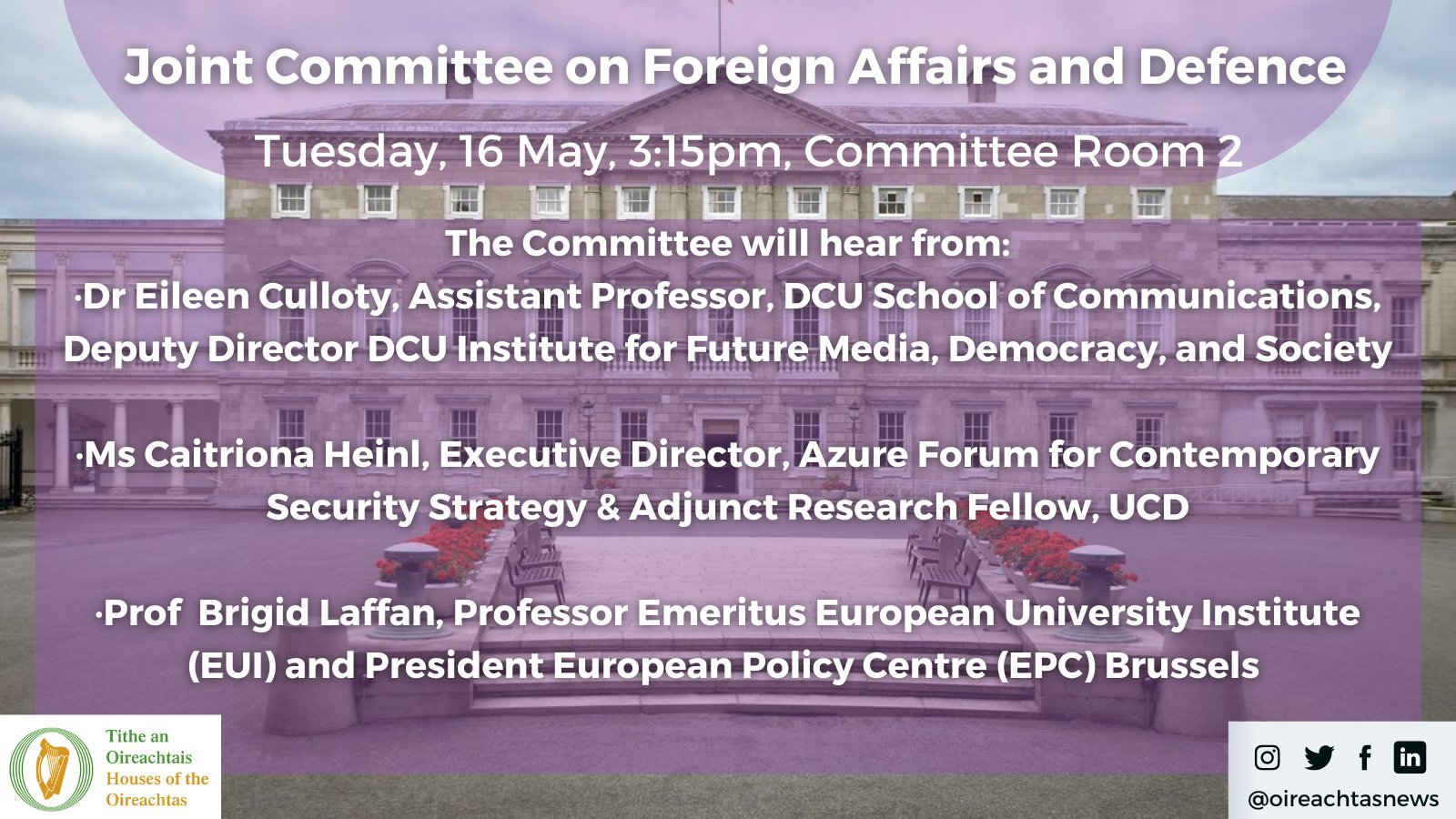
Executive Director Caitríona Heinl, appeared before the Oireachtas Joint Committee on Foreign Affairs and Defence. Her written statement to the Joint Committee can be found here.

Irish Examiner report on a recent Azure Forum Strategic Insight. Read more…

Irish Examiner report on a recent Azure Forum–Belgian Embassy high-level seminar. Read more…

Irish Times report on a recent Azure Forum–Belgian Embassy high-level seminar. Read more…

Azure Forum Adjunct Senior Research Fellow Edward Burke and Adjunct Senior Fellow Gareth Prendergast addressed delegates at ‘The Irish Civil War National Conference’ at University College Cork (UCC), on 15-18 June 2022. The conference was organised by UCC to mark the centenary of the Irish Civil War and was supported with funding from the Irish Department of Tourism, Culture, Arts, Gaeltacht, Sport and Media as part of Ireland’s Decade of Centenaries Programme for 2022. During the four-day conference, over 130 scholars discussed the political, social, cultural, military, and economic dimensions of the Irish Civil War. Edward presented his paper on ‘Donegal Loyalists and the Civil War: Fear, Adaptation and Resistance’ on Thursday 16 June, as part of a panel discussion on the impact of the Irish Civil War across borders. On Friday 17 June, Gareth discussed his research on ‘The National Army and the counter-insurgency campaign in Cork, 1922-23’, as part of a panel on ‘War, Fighting and The National Army’. Recordings of both Edward’s and Gareth’s panel discussions are available at the links here and here.

Azure Forum Advisory Council Member Paddy McGuinness addressed delegates at the Mastercard Threatcasting Workshop at the Mastercard Technology Hub in Dublin on 14-15 June 2022. Research Fellow Mark Williams also participated in the workshop. Over the course of two days, participants from across industry, academia, and the public sector heard expert insights into the challenges society faces from cyber and hybrid threats. Participants took part in a series of threatcasting workshops, in which attendees were asked to envisage future scenarios involving misinformation, information warfare and large-scale destabilizations, and to identify specific actions, indicators and concrete steps that could be taken to disrupt, mitigate and recover from these potential future threats. Speakers included: Ron Green, Chief Security Officer, Mastercard; Alissa “Dr. Jay” Abdullah, Deputy Chief Security Officer, Mastercard and former White House Deputy CIO; and Brian David Johnson, Professor of Practice, Arizona State University.

The Azure Forum continued its prior 2021 engagement with the CELIS Institute on the important topic of national security and strategic investment screening at the CELIS Forum on Investment Screening (CFIS 22) held at Uppsala University, Sweden. The conference brought together European Union officials, national experts, diplomats, academics, business leaders, and representatives of civil society and the media from across Europe and globally. Caitríona Heinl co-moderated a panel with Jens Hillebrand Pohl of Maastricht University on ‘National Security as a Limit to Sovereign-Driven Investment’. Speakers included: Alejandra Torres Camprubí, Associate, Foley Hoag LLP; Athanasios Drougkas, Network and Information Security Expert, European Union Agency for Cybersecurity (ENISA); Alessandro Lazari, Senior Key Account Manager, F24 AG; John Lash, Founder, Darkhorse Global; and Peter Muchlinski, Professor of International Commercial Law, SOAS University of London. The panel theme focused on how national security concerns could serve as a limit on sovereign-driven investment. In addressing the topic, speakers discussed delimiting the concept of national security, cybersecurity investments in critical sectors, the protection of critical resources and strategic assets, assessment methodologies for national security threats, and inward foreign direct investment (FDI) regulation in the United Kingdom.

Caitríona Heinl addressed delegates in a conference on ‘Cyber diplomacy and governance: Opportunities, challenges and ways forward for the Arab countries’ on 16-17 May 2022 at the Dead Sea, Jordan. The conference was organised by the Ministry of Foreign Affairs and Expatriates of the Hashemite Kingdom of Jordan together with the Jordanian National Cybersecurity Centre and the Royal Institute of International Affairs (Chatham House). A group of stakeholders from the Arab region were convened including diplomats, policymakers in charge of cyber affairs and a select group of international experts to provide a space to facilitate a structured discussion between Arab stakeholders on challenges and opportunities to international cyber governance from their vantage point; identify ways in which Arab countries can enhance their coordination to support their future engagements in the UN Open-ended Working Group and related forums; and identify concrete steps that Arab countries can take to operationalize the agreements they have endorsed at the UN and to reflect them in national policies and initiatives. Caitríona provided analysis on lessons from other regions, focusing in particular on regional groupings in Asia such as ASEAN. She examined practical mechanisms to enhance coordination that are being developed in such regional groupings, focusing on concrete ways to build consensus, develop regional positions on cyber diplomacy and operationalise norms of responsible state behaviour with a view to providing good practice examples for a future ‘unified Arab cybersecurity governance outlook’.

Caitríona Heinl together with fellow discussants discussed the following abstract for the 2022 Asian Forum on Global Governance. The battle for “hearts and minds” is described as old as conflict itself – so how has technology disrupted information warfare? The advent of the digital public sphere, powered by the rapid rise of social media and its potential to amplify a message exponentially and immediately has seriously challenged the scope of human intelligence and its ability to question, verify and then publish information. The impact of this is evident – communities are more polarised, positions are more hardened, and the online ‘mob’ can dictate both the content and the tone of legitimate debate. In this new era of communication, how can the public distinguish news from fake news, facts from alternate facts and information from disinformation? How can free societies arm themselves against the weaponisation of communication tools, and how can we manage their disruptive effects on social cohesion and vulnerable groups?

Azure Forum Executive Director Caitríona Heinl was moderator of a high-level panel on “Strife on the Streets: Responding to Kinetic Info-Wars’ on 25 April 2022 at the Ministry of External Affairs/Observer Research Foundation (ORF) Raisina Dialogue in New Delhi. The panel theme focused on the manipulation of information by state and non-state actors as a weapon of war. Discussants were asked to consider the blurring of lines between fact and fiction where information warfare is ‘set to be the 21st century’s most devastating and consequential digital battleground’. Questions addressed included: What are the significant vulnerabilities and limitations of the information ecosystem that make it susceptible to bad actors? How can states and corporations limit offline harms of online disinformation wars fuelled by bots? Without endangering free speech, how can they address the social divisions and subversion engendered by manipulated content? Speakers included: Lt. Gen. (Retd.) Rajesh Pant, National Cyber Security Coordinator at the Prime Minister’s Office, India; Henri Verdier, Ambassador for Digital Affairs, at the Ministry for Europe and Foreign Affairs, France; Jeremy Quin, Minister of State (Minister for Defence Procurement), United Kingdom; Erin Saltman, Director of Programming at the Global Internet Forum to Counter Terrorism (GIFCT), United States; and Janka Oertel, Director of the Asia Programme at the European Council on Foreign Relations, Germany.
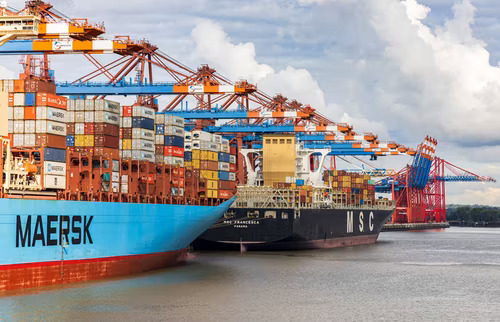
Journal.ie report on newly published Azure Forum research. Read more…

Journal.ie report on newly published Azure Forum research. Read more…

Irish Examiner report on newly published Azure Forum research. Read more…

Irish Times report on newly published Azure Forum research. Read more…

Irish Independent report on newly published Azure Forum research. Read more…

Vice Admiral Mark Mellett Rtd argues that Ireland can use renewable energy to help wean Europe off hydrocarbons in light of Russia’s invasion of Ukraine. Read more…

Vice Admiral Mark Mellett Rtd appeared on the Pat Kenny Show on Newstalk FM to discuss the current situation with Russia and Ukraine. Read more…
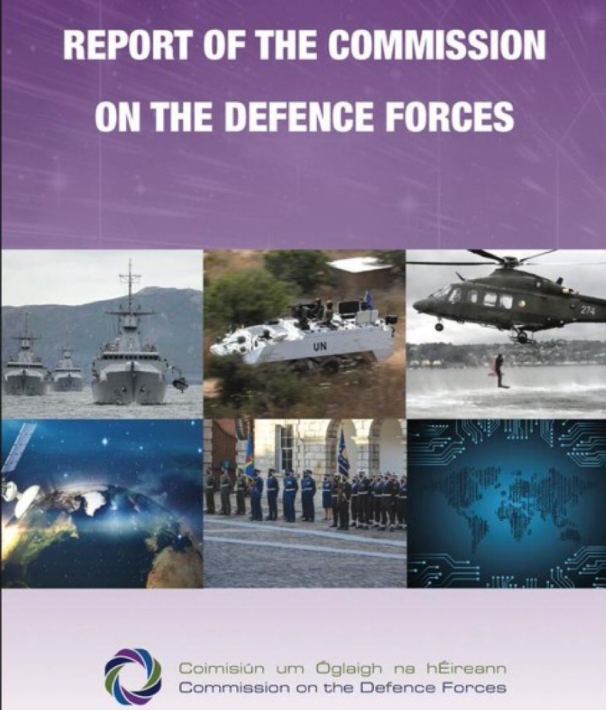

Vice Admiral Mark Mellett Rtd writes on the need for a joint defence strategy in light of Russian war games off the coast of Ireland. Read more…
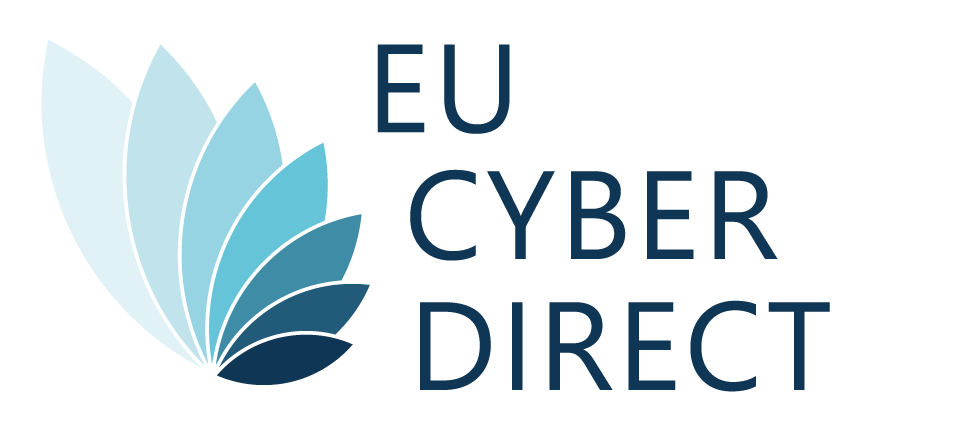
Caitríona Heinl continues to be Co-Editor-in-Chief alongside Patryk Pawlak for the Directions platform running since 2020 under the EU Institute of Security Studies’ EU Cyber Direct project. Directions is an independent platform* for exchanging and discussing ideas on Europe’s place in the digital world and world views on digital Europe. Through analysis, commentaries and interviews, Directions aims to stimulate a European debate and showcase the diversity of voices about the present and future of cyber and digital policies – at the national, European and global level. Latest articles can be found here
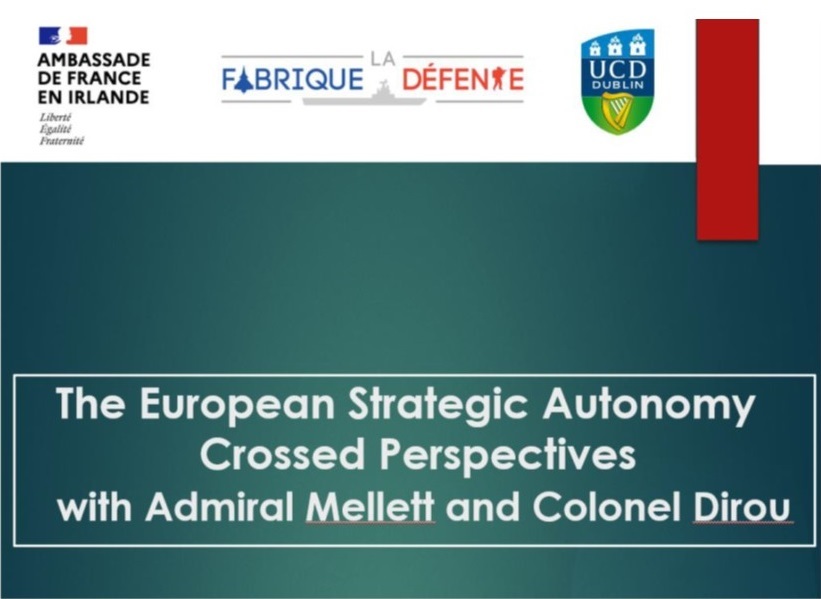
Vice Admiral Mark Mellett DSM (Rtd) took part in a seminar on European Strategic Autonomy hosted by the French Ministry of Defence and the French Embassy Dublin.
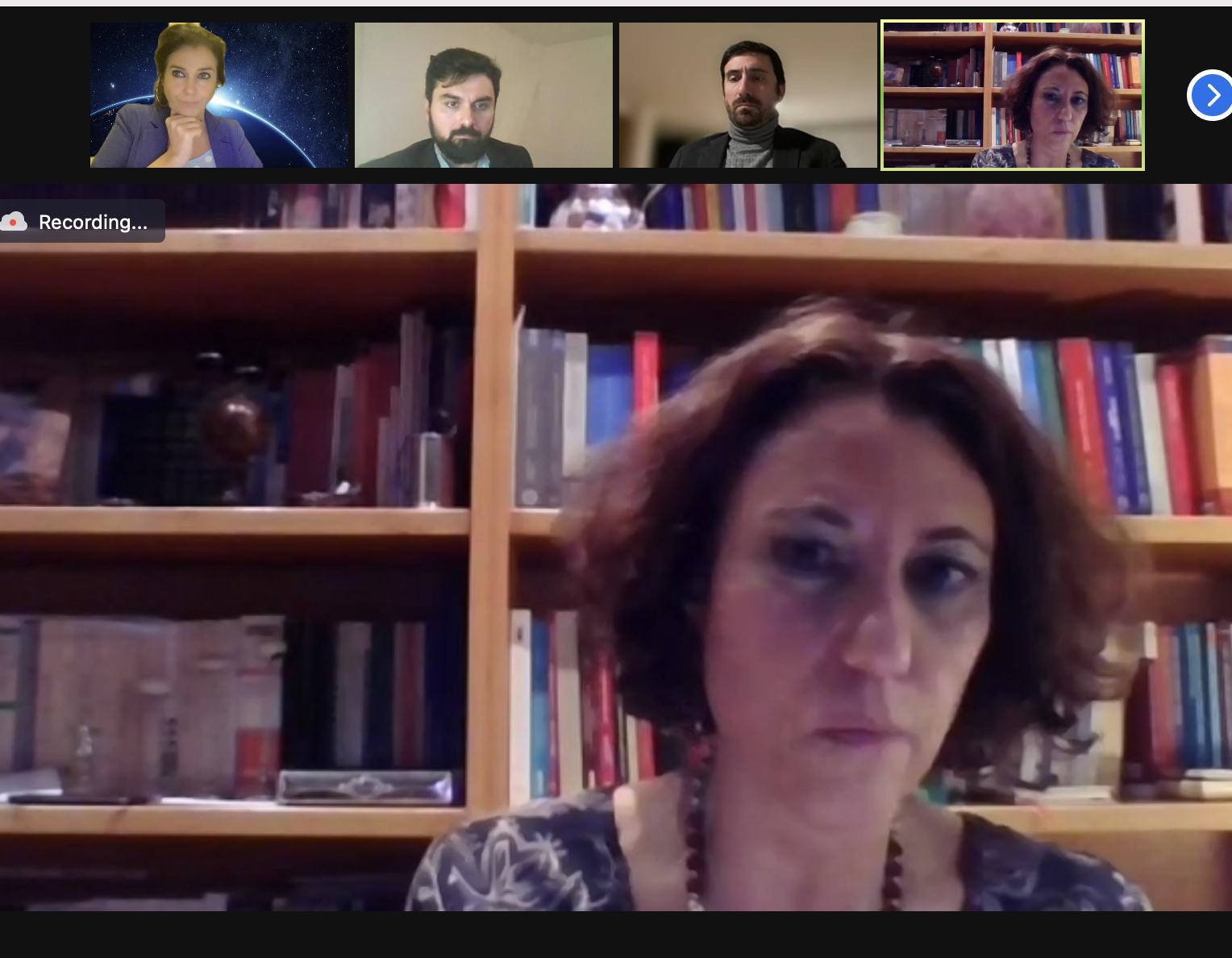
Caitríona Heinl moderated a panel for the CELIS Institute’s virtual symposium on investment screening on 03 December 2021. The panel explored the topic of “Delimiting the concept of investment security”, focusing primarily on national security and foreign investment screening.
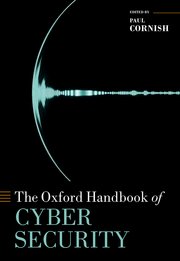
Caitríona Heinl contributed two chapters entitled “Technology: Access and Denial” and “Maturing Autonomous Cyber Weapons Systems: Implications for International Cyber Security and Autonomous Weapons Systems Regimes” to the newly published (November 2021) Oxford Handbook of Cybersecurity.
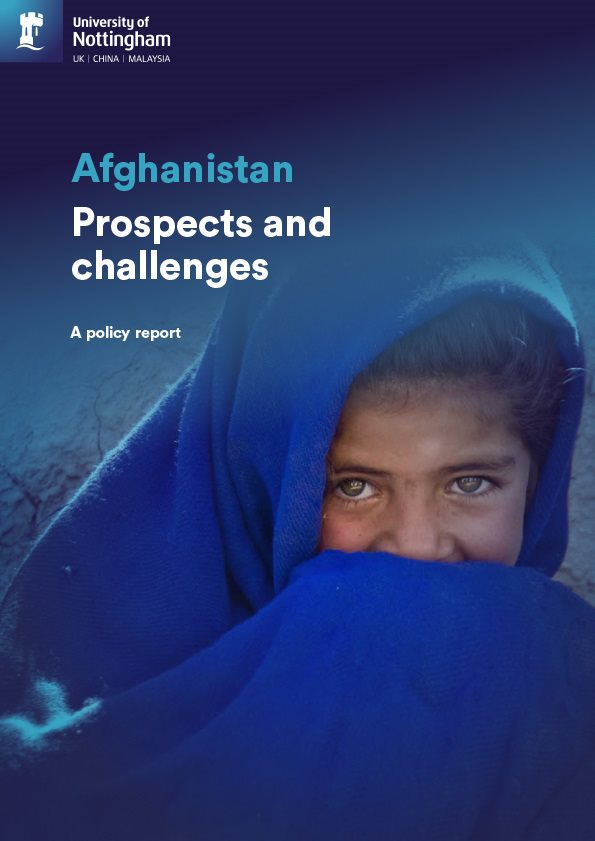
Adjunct Senior Research Fellow Edward Burke contributed to the University of Nottingham report: “Afghanistan: Prospects and Challenges”. An essential read for those interested in foreign policy and Afghanistan.
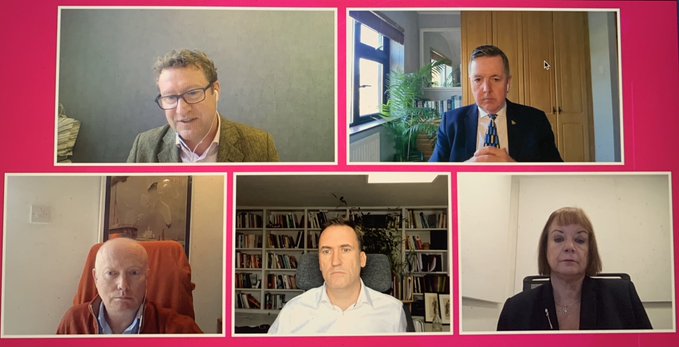
The Chair of the Azure Forum, Vice Admiral (Rtd) Mark Mellett spoke at the MacGill Summer School on ‘The Future of Ireland’ on Friday 29 October. This also marked the beginning of the Azure Forum’s partnership with MacGill on some exciting projects for 2022.
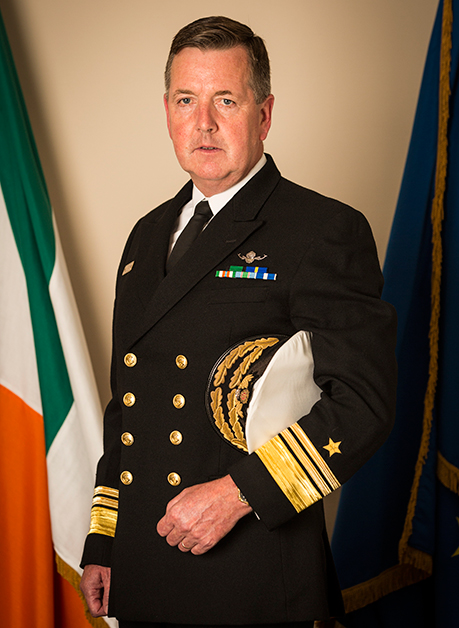
Mark Mellett moderated a webinar on ‘13 Years since the 2008 Russia-Georgia War, Legacy for the European Security’, organised by the Embassy of Georgia to Ireland on October 27th 2021. Welcoming remarks were provided by H.E. George Zurabashvili, Ambassador of Georgia to Ireland, and speakers included Ketevan Chumbadze, Acting Political Director, the Ministry of Foreign Affairs of Georgia; Kate Fearon, Deputy Head of the European Union Monitoring Mission in Georgia; Jean-Marc Thouvenin, Professor at the University Paris Nanterre; and Miceál O’Hurley, Editor, Diplomacy in Ireland – The European Diplomat.
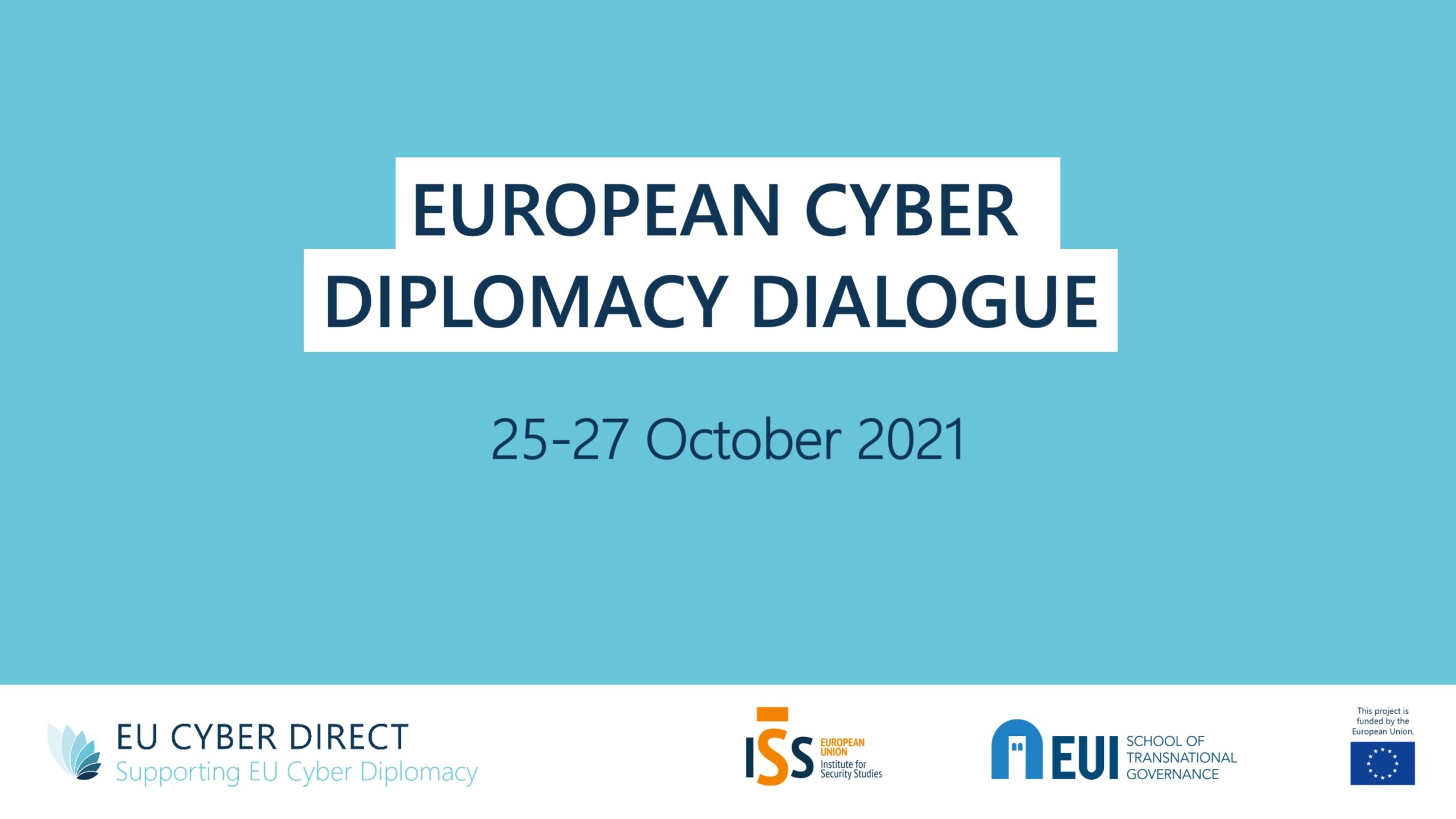
Caitríona Heinl was invited to speak at the European Cyber Diplomacy Dialogue hosted by the European University Institute, Florence.
John-Joseph Wilkins was invited to present his paper “The EU doesn’t stop at the water’s edge”: EU-India and the Indo-Pacific to a meeting of experts organised in the context of the EU India think tanks twinning initiative 2020-22. Participants were invited to share their views on the role of the EU in the Indo-Pacific region and how best to enhance the Strategic Partnership. His paper can be found here.

Caitríona Heinl was invited to speak at the Fourteenth International Forum “Partnership of State, business and civil society in ensuring international information security” which was organised by the National Association for International Information Security (NAIIS) Russia in December 2020. She participated in a roundtable moderated by Professor Anatoly Alexandrovich Streltsov on “International law and confidence-building measures in the ICT-environment: political and legal issues”, presenting material on “Regional confidence-building measures in the ICT environment”.

Caitríona Heinl moderated a panel discussion on traditional and digital supply chains at CyFy 2020 in October – the annual cyber and digital conference organised by the New-Delhi based think-tank, the Observer Research Foundation. Sunjoy Joshi, Chairman of the Observer Research Foundation, Sean Kanuck, Founder and CEO of EXEDEC LLC, Alicia Garcia-Herrero, Chief Economist (Asia Pacific) at Natixis and Ussal Sahbaz, President at EDAM discussed the restructuring of technology supply and value chains in the wake of U.S. sanctions, including the potential impact on Chinese and American companies in the short term. They considered whether opportunities would be created for “nearshoring” toward South and Southeast Asia. Other driving questions included whether the so-called challenge to the dominance of two powers in technology supply chains is overhyped, and whether current trends will see a meaningful restructuring. If you would like to watch the session, you can do so here.
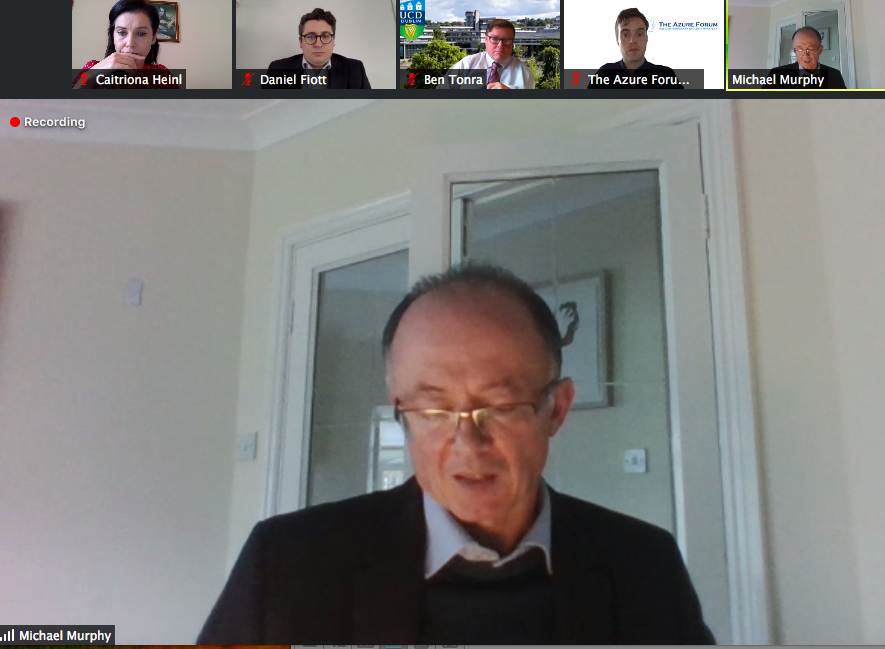
Michael Murphy, Member of The Azure Forum Advisory Board and national security contact point at Enterprise Ireland, and Distinguished Fellow Ben Tonra joined The Azure Forum’s October 2020 panel discussion on “Covid-19 and European Strategic Autonomy: Is the emergency driving an expanded ‘soft security’ concept?”. Together with Jens Hillebrand Pohl, Adjunct Lecturer at the Department of International and European Law at Maastricht University and Daniel Fiott of the EU Institute for Security Studies (EU ISS), they provided their thoughts on what strategic autonomy means within a geostrategic/security context from an Irish perspective. They examined the debates surrounding foreign policy or defence matters as they relate to the concept of European strategic autonomy and what this means for Ireland, highlighting differences between European and Irish perspectives.

Caitríona Heinl was invited to speak at the first track 1.5 cyber consultations between the EU and the Republic of Korea, jointly organised by the EUCyberDirect Project of the EU Institute of Security Studies (EUISS), the German Marshall Fund and the Korean National Security Research Institute on 6 October 2020. The panel discussion was chaired by Hannes Ebert of the German Marshall Fund of the United States, focusing on cyber confidence building measures and ways to build trust to prevent cyber conflict escalation. Opening inputs were provided by Joanneke Balfoort, Director, SECDEFPOL DMD Security and Defence Policy at the European External Action Service and H.E. Jong-in BAE , Ambassador for International Security Affairs at the Ministry of Foreign Affairs, ROK. Fellow panelists included Professor Nohyoung Park of the School of Law, and Director of the Cyber Law Centre at Korea University; Carmen Gonsalves, Head of International Cyber Policy at the Dutch Ministry of Foreign Affairs; and Joonkoo Yoo, Research Professor at the Korea National Diplomatic Academy.

Caitríona Heinl and Sheelagh Brady presented the findings of the commissioned report (undertaken to assist policy formation): ‘Cybercrime: Current Threats and Responses – A review of the research literature’ on 8 October 2020 at a webinar organised by the Research and Data Analytics Unit in the Department of Justice and Equality of the Government of Ireland. This report examines existing research literature on cybercrime including current and emerging threats, the Irish anti-cybercrime landscape and models of best practice for combatting cybercrime in order to inform both policy and practice across the criminal justice system in Ireland. It explores several key themes including the lack of consensus surrounding the term ‘cybercrime’; the ever evolving threat landscape; the national and international responses in this regard; and the role of legislation in combatting cybercrime. The report serves as an evidence based analysis of the current landscape to inform policy makers with responsibilities in the field of cybercrime. The presentation was followed by a Q&A session together with representatives from the Department of Justice and Equality, the National Cyber Security Centre and the Garda National Cybercrime Bureau. The full report is available on the Department’s website. As a foundational text, the literature review is timely given that'[o]ver the last six months, Irish society has become increasingly dependent upon our digital technologies, with many businesses and public sector bodies adapting to remote working due to the COVID-19 crisis. Such increases in remote working raises the risk of exposure to cybercriminals and deepens the potential negative effects of a cyberattack.’ The review constitutes a valuable resource and will act as a springboard for future empirical research on best practice in this area, providing a body of evidence that is essential to inform future policy discussions and development.

Senior Fellow Steve Honiss took part as a subject matter expert in The Azure Forum’s September 2020 panel discussion on “Malicious cyber-enabled state activity in the healthcare sector: State espionage, cyber attacks, and international law responses”. Together with Kaja Ciglic of Microsoft, Professor Joanna Kulesza, and Chris Painter, President of the Global Forum on Cyber Expertise, Steve provided his analysis on reported cases of cyber attacks on medical institutions, Covid-19 research centres and healthcare infrastructure as well as state-sponsored theft of vaccine research/espionage. In particular, he outlined likely motivations behind this reported behaviour, and the possible implications for the near future.

Adjunct Senior Fellow Gareth Prendergast took part as Discussant in The Azure Forum’s August 2020 panel discussion on “Trade and strategic overreliance on global supply chains: A new phase in globalisation?”, providing his feedback to interventions from James Crabtree of the Lee Kuan Yew School of Singapore, Paul Gillespie, Adjunct Senior Fellow at University College Dublin and David Ramirez.

Caitríona Heinl was invited by EU Cyber Direct to be Chair for a ‘Funding cyber research’ workshop as part of the “Closing the Gap: International Conference on Cyber, Digital and Tech’ on 17 July 2020. The aim of the workshop was to provide insights into different mechanisms for obtaining funding in support of cooperation and research projects focused on cyber and digital issues. The expert speakers each play important roles in funding cutting-edge research and policy initiatives on these topics. Eva Junyent of the European Commission Service for Foreign Policy Instruments, Ruhiya Seward of the International Development Research Centre Canada, Rachael Falk at the Australian Cybersecurity Cooperative Research Centre and Eli Sugarman of the Hewlett Foundation explored questions surrounding funding avenues within their respective organisations; the types of initiatives that are supported; their thoughts on what makes a good grant application as well as the current state of cooperation/research; and most importantly what is the policy impact of the projects that these organisations fund. The recording and powerpoint slides are available.

Caitríona Heinl was invited by EU Cyber Direct to be Chair for a panel session on “Different shades of norms: regional perspectives” as part of the “Closing the Gap: International Conference on Cyber, Digital and Tech’ on 15 July 2020. The purpose of this panel was to showcase new research and give authors an opportunity for feedback from peers and practitioners. In broad terms, this reflected (1) the problem statement, research question, and policy relevance; and (2) preliminary conclusions/main ideas, and implications for policymakers. Early-career scholars presented their research on cyber norms from their regional viewpoints, providing insights on South Asian, ASEAN, African, and Brazilian perspectives. As Discussants, Jacqueline Eggenschwiler of the University of Oxford, Daniel McBryde of Global Affairs Canada and Chris Painter, Chair of the Foundation Board of the Global Forum on Cyber Expertise provided their feedback on this research.

Caitríona Heinl took part in a panel discussion on the proposed Commission on Defence that was organised by the Irish Defence Forces Officers’ Club (IDFOC) on 25 June 2020. Expert speakers included Ben Tonra, Sven Biscop, Brendan Flynn and Edward Burke. Thirty years after the Gleeson Commission Report, the Commission on Defence provided for in the Programme for Government June 2020 will shape the Defence Forces for a generation to come. The panel discussed the issues that could be covered by the Commission, its Terms of Reference, the composition of the Commission and governance structures required to ensure that its proposals are implemented.

Caitríona Heinl took part in a panel discussion as part of an expert-level seminar on ‘Strategy building for small states in European security and defence’ on 28 February 2020. This event was part of a series of three research-based, half-day seminars organised by the IIEA with the support of the ERASMUS+-funded NORTIA academic network. This third seminar engaged a broad cohort of decision-makers, opinion leaders and commentators, aiming to further debate on defence policy with the input of leading scholars and practitioners in three subjects. Fellow speakers included Sven Biscop, Director of Europe in the World Programme at Egmont Institute; Heidi Maurer, Lecturer in EU Politics, at the University of Oxford; and Daniel Fiott, Security and Defence Editor at the EU Institute for Security Studies (EUISS).

Caitríona Heinl joined a panel discussion with Bobby McDonagh and Edward Burke on “National security strategy: How should we advance and protect Irish national interests using the means at our disposal?” at the National Security Summit Ireland on 25 February 2020.
Caitríona Heinl chaired the cyber track at the National Security Summit in February 2020, moderating the session on the nexus between the cyber and national security threat landscape with the Head of the National Security Analysis Centre (NSAC), members of the National Cyber Security Centre (NCSC) Ireland and the former Deputy National Security Advisor to the UK. Notable insights included how MAD nuclear logic that kept the traditional international system in check does not fully translate to current cyber threats.

The Azure Forum was a knowledge partner of the National Security Summit Ireland (NSSI), providing advice on thematic focus and programme content for NSSI 2020, with the shared desired outcome of promoting greater discussion and debate of national security issues and increased study of contemporary security strategy in Ireland.
Caitríona Heinl gave a lecture at Maynooth University for the Irish Defence Forces’ Junior Command and Staff course on “The nature of global cyber threats to which Ireland might be susceptible”, 29 January 2020.
Caitríona Heinl chaired the session “Future Challenges” at the launch of the Defence Forces Review edited by Lt. Cmdr Paul Hegarty in December 2019. Discussions were held on emerging developments that may challenge our current small state and Western thinking on present day and future strategic questions.